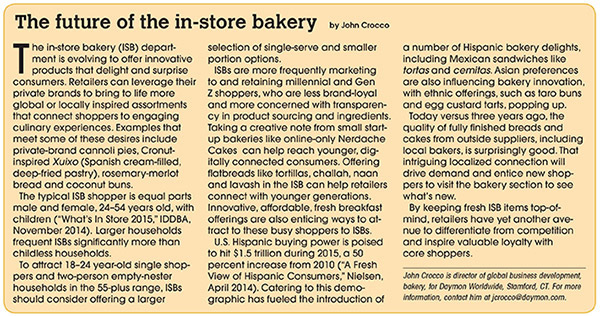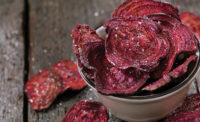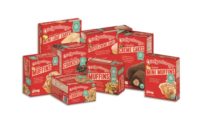The January 2015 report “Private Label & National Brands: Dialing in on Core Shoppers” from IRI, Chicago, notes that private label now accounts for $120 billion in annual packaged goods sales, up 2.1 percent. Those sales include more than $304 million in the grocery store channel. Also, the report notes that “more than 80 percent of consumers feel that private label solutions offer as good or better quality compared to their national brand counterparts.”
As private label continues to mature, bakers and snack producers are finding new ways to innovate to meet consumer demand—a trend that presents significant opportunities to diversify revenue streams.
According to a study commissioned by the Private Label Manufacturers Association (PLMA), private label is expected to grow as supermarket shoppers want more fresh options in the deli, dairy and bakery departments. More than half of survey respondents said they buy more private label products now than they did five years ago, and 44 percent said they currently buy store brands either always or frequently. The frequency of purchase increased in the bakery department, where it reached 47 percent (“Store brands expected to grow as supermarket shoppers want more fresh options in deli, dairy and bakery,” PLMA, July 2015).
When asked which types of products they would like to see more of in the bakery:
- 31 percent said they would like more items baked on-site.
- 31 percent said they would opt for products containing less high fructose corn syrup, sugar, corn syrup and bad fats.
- 25 percent would look for more nutritional and freshness information, greater variety of portions and more emphasis on healthy ingredients.
Respondents also stated a desire for more product sampling and demonstrations in the bakery.
Private label leaders
Retailers continue to stride into category-leading directions with baked goods and snacks. “Following the success of better-for-you snack bars like KIND, retailers ranging from CVS to Publix have introduced private brand versions in new and unique super fruit and nut-packed flavors,” says Christopher Durham, founder, My Private Brand, and vice president of retail brands, Theory House, Charlotte, NC. As part of its Gold Emblem Abound line, CVS offers multiple snack bars like Mango & Raspberry, Red Fruit & Chia, Pomegranate & Cranberry and Chocolate Chunk & Chia, all packed with multiple grains, fruits, nuts and seeds.
Other private label snacks that exemplify national-brand-better (NBB) positioning include:
- ALDI SimplyNature Exotic Blend Vegetable Chips
- CVS Gold Emblem Abound Sweet & Salty Probiotic Trail Mix
- 7-Eleven 7-Select GO!Smart Sweet Chili Sprouted Corn Tortilla Chips
- Target Simply Balanced Wheat Crackers With Sprouted Grains
- Whole Foods Market Brie Bites With Mostarda
NBB products stride into positioning as unique brands. “Retailers have shifted from a period of rampant private brand penetration growth driven by economic pressures that forced shoppers to save money to a period of retrenching and strategic optimization,” says Durham. “Private brands are rapidly shifting their strategic importance from value player and margin driver to differentiator. We’re now entering a time when retailers can promote their brands, not based on value, but based on quality and shopper choice.”
The IRI report notes that the top-selling private label product category in the grocery channel is fresh bread and rolls, and in the warehouse/club channel, it’s the No. 2 category (second only to bottled water). In the dollar store channel, the cookies category takes the top slot for private label sales.
Durham points to the artisanal flatbreads from Kroger’s Private Selections in gourmet varieties like Fire Roasted Vegetable, Margherita Napolitana and Pesto & Mozzarella as helping drive the category forward. And Walmart has taken a similar approach with its Sam’s Choice brand, offering Spinach Mushroom, Nacho Supreme and Loaded Baked Potato Flatbread Pizzas. “We’re seeing that cost-effective choices don’t mean giving up taste,” he says.
Other private label baked goods helping drive category growth include:
- Kroger Simple Truth Wheat Ciabatta Dinner Rolls
- Trader Joe’s Burrata, Prosciutto & Arugula Flatbread
- Publix Bakery Chantilly Decadent Dessert Cake
- ALDI Benton’s Caramel Coconut Fudge Cookies
- Trader Joe’s Salted Caramel Bread Pudding
NBB strategies
“Over the last five years, private label has continued to change in positive ways,” says Jen Linke, vice president, category management, Federated Group, Arlington Heights, IL. “Product quality and consistency has continued to improve. More retailers are looking at the competitive advantage that private label brings to the mix from the standpoint of customer loyalty and margin.”
Linke notes that snacks have grown in two distinct directions. “The first is through healthier options with more rice-based and baked items,” she says. “The other direction is in indulgent flavors. There is a mindset that ‘if I’m going to snack, I want to really enjoy it.’” This has led to more innovation and a greater diversity of flavor options than in the past.
Working with retailers on private label concept development requires a unique set of parameters. “The key is to understand each retailer’s portfolio of private brands and their individual strategies,” says Durham. “If you understand the business goals, customer targets and positioning, you can target individual brands and play to retailers’ corporate strategies.”
There was a time when private label focused exclusively on low price, high margin and acceptable quality, notes Durham. “That time has passed, and each brand has the opportunity to deliver on different business goals and objectives,” he says.
Full-service supply-chain ingredient suppliers can do much to help retailers during private label R&D. “In many cases, when working with retailers and private label lines, they may not have the dedicated teams or resources in terms of product development that the national brands have,” says Ricardo Rodriguez, marketing manager, confectionery and bakery, Ingredion Inc., Bridgewater, NJ. That’s why it’s important that they work closely with their ingredient suppliers to fast-track their product development timelines. “The key is developing a working relationship at the beginning of the process, enabling both sides to understand the goals and objectives and to be able to deliver them in the appropriate time frame.”
Innovative R&D approaches can help private label products grow into category leaders. “One benefit to working in the private label arena is the increased opportunity for innovation,” says Linke. “Private label manufacturers can often be more flexible and create something unique. Convincing retailers to take the product could be the difficult part, but there is usually a lot of collaboration that occurs between a retailer and a manufacturer when something new is being created.”








